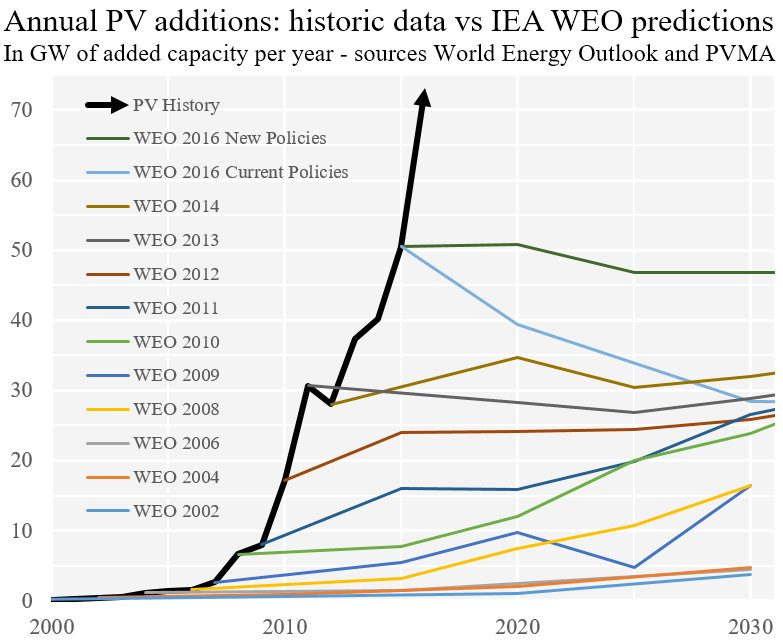
This question will resolve as YES if more than 50% of new cars sold worldwide in the year 2030 are electric.
The source for determining the percentage of electric cars sold will be the International Energy Agency (IEA) annual report on electric vehicles. The report will be released in 2031 and will provide data on the percentage of electric cars sold in 2030. This question does not include hybrid cars, only fully electric cars.
The question does not consider any potential changes in regulations or government policies that may affect the sales of electric cars.
This question does not consider any potential changes in consumer behavior or technology development that may affect the sales of electric cars.
People are also trading
https://rhomotion.com/news/global-ev-sales-up-28-in-2025/
They don't give the market share though. Nor do they give the BEV VS PHEV breakdown.
Agree with Fergus, this market is too optimistic at >60%.
Just google "International Energy Agency annual report on electric vehicles 2024" to see the current state. Since hybrids (PHEVs in the language of the report) don't count, one can calculate that ~12.5% of cars sold in 2024 were BEVs. So we need to 4x that in 6 years. It's not impossible of course, there may even be a decent chance, but >60% seems too high.
On China and BEVs, from the report: "The acceleration of PHEV sales in China led the share of electric car sales that are battery electric to fall from 80% in 2020 to below 60% in 2024, though in absolute terms battery electric car sales increased sevenfold over the same period, demonstrating their continued appeal to new customers." (Recall that PHEVs don't count for this market.)
@pietrokc please feel free to convince people to take my limit order at 40%, if you think that too is optimistic. It'll wreck my leagues ranking for this month, but I expect there's a good chance I'll come out ahead in the long term.
Arbitrage opportunity: https://manifold.markets/TobiasSowaaed/will-the-majority-of-new-cars-sold-c4d566afc8c7
@FergusArgyll The resolution criteria includes the statement "This question does not include hybrid cars, only fully electric cars.".
@Duncn Yes, that's this question - I was talking about the possible arb at
https://manifold.markets/TobiasSowaaed/will-the-majority-of-new-cars-sold-c4d566afc8c7
Despite uncertainties in the outlook, the share of electric cars in overall car sales is set to exceed 40% in 2030 under today’s policy settings.
https://www.iea.org/reports/global-ev-outlook-2025/executive-summary
However, the global EV outlook for 2025 onwards is up to 100,000 units lower than previously predicted. The global EV share is forecast to reach 22.1% in 2025, then 44.9% in 2030, increasing to 69.7% in 2035. Global volumes are set to increase from 14.2 million in 2023 to 71.6 million units in 2035.
Actuals from 2015 to 2023. Forecasts from 2024 to 2035. Light vehicles include passenger cars and light-commercial vehicles. Electric vehicles (EVs) include battery-electric vehicles (BEVs) and plug-in hybrids (PHEVs).
Bloomberg seems to put it at 42% in 2030 and also includes hybrids
I'll take those odds. Forecasts have tended to significantly underestimate EV adoption rates.
Appreciate the posting of updated forecasts though.
@equinoxhq These all include hybrids though.
This question does not include hybrid cars, only fully electric cars.
@FergusArgyll here's everything you need to know about IEA forecasting abilities:

In 2024 452 GW of solar were added to global capacity (10x of what IEA predicted would happen by now).
@FergusArgyll That is a fair point, and I could end up being wrong, but I think we're going to get to the point where BEVs are simply cheaper than cars with a gas engine, whether hybrid or not (not only in total cost of ownership given a certain amount of driving, as is the case now, but in up-front price) by 2030, as battery costs come down. Also figure it could (although this is more speculative) end up being the case that we use vehicle to grid connections to provide some of the battery capacity that's needed for grid stabilization as more renewable power comes online, so owning a vehicle with a decent sized battery allows you to make some money off it.
I think as well that the discussions in these markets are quite US focused, when the majority of EVs are sold in China, where rolling out large infrastructure projects is something they know how to do, and I'm not worried EV adoption in China (or Europe for that matter) will be much slowed by lack of charging infrastructure.
We'll see! There are lots of things that could derail the most likely path I see things taking over the next few years. And a "everyone likes hybrids enough to cause this market to resolve NO, although EVs including PHEVs > 50%" outcome is plausible.
oh, nvm now it works! (I was wrong, the UI tricked me)
Yeah it's to exit my position so I don't need mana.
Though a lot of them got cancelled so not sure what happened. Back up now.
Skimming the 2024 report, I'm surprised to see China way in the lead regarding new EV sales. We have 3 major regions accounting for 95% of EV sales (China, Europe, US).
These regions make up 65% of the total car sales, so as a rule of thumb, we can consider the remaining 35% to count fully towards the ICE side*. That means we need to reach ~70% new sales being EV in the 3 big regions to reach 50% globally. I'm guessing China will make that target, but I'm very skeptical of the other two. It's a NO for me.
* EV infrastructure is very dependent on network effects, and since poorer countries have way older cars as a rule, I simply do not see this number budging on a 5 year timeframe.
If you compound falling battery prices and offers to charge for free (or being paid for it) that will go mainstream, I don't see how people could still buy a majority of ICE in 5 years.
@figo https://www.amber.com.au/ 🇦🇺❤️ can't wait to see this happening elsewhere. The duck curve is coming after electricity prices all around the world 🦆📈
For bets on this in France: I created this market https://manifold.markets/figo/will-it-be-possible-to-charge-an-ev